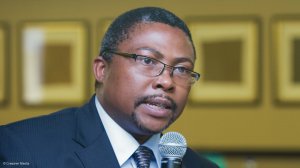TFR sees Swazi link, Shongololo raising coal export capacity to 120mt/y

TFR CEO Siyabonga Gama on the Swazi link and the Waterberg projects. Camera Work & Editing: Nicholas Boyd. Recorded: 30.6.2014
JOHANNESBURG (miningweekly.com) – Transnet Freight Rail (TFR) CEO Siyabonga Gama reported on Monday that the feasibility study into a proposed rail link through Swaziland – which would eliminate non-coal traffic on the export channel from the Mpumalanga coalfields to Richards Bay – is at an advanced stage and that a business case should be presented for approval by the end of December.
Speaking following the release of the Transnet Group’s results, Gama indicated that the new link, together with the introduction of new operating solutions, had the potential to raise the coal-export corridor’s capacity to 120-million tons.
During the 2013/14 financial year, export-coal volumes declined by 1% to 68.2-million tons, from 69.2-million tons in the previous year. The fall was attributed to a decline in coal prices, a nine-day power disruption at the Richards Bay Coal Terminal (RBCT) and industrial action. Together the strike and the power disruption lopped about 3-million tons off the anticipated export figure.
However, TFR and coal exporters have also been in ongoing discussions about raising the capacity of the export channel, which the miners see as the main constraint to increased export volumes.
Officially, Transnet’s R307.5-billion Market Demand Strategy anticipated raising yearly coal export capacity to 98-million tons by 2019. However, Gama indicated that a combination of the Swaziland link with its 200-wagon ‘Project Shongololo’ operation solution had the potential to increase capacity even further.
He reported that the dual AC/DC capability of the new 19E electric locomotives being introduced to the corridor meant that some trains were already bypassing the Ermelo yard, which, in turn, was having a material positive effect on turnaround times. In the past, the DC coal trains would be reconfigured at Ermelo to enable the cargo to be moved along the AC channel to the RBCT.
“The new Shongololo trains have already reduced cycle times by up to 35% between Richards Bay and the coalfields. That alone is also adding new capacity on the corridor and, as we increase the number from about seven to nine trains, significant additional capacity will be created,” Gama reported.
The Swaziland connection, meanwhile, would allow TFR to remove the 12 general-freight trains currently operating on the corridor daily, enabling it to operate the coal line exclusively on heavy-haul principles.
“With the Swazi link we will create an additional 14 slots a day, which will translate to just over 120-million tons of capacity, without any major investment, except for investments related to tunnelling a second line on the Overvaal tunnel”.
TFR was also making progress on plans to connect the Waterberg coalfields, as well as those in Botswana, to export terminals in KwaZulu-Natal, with the full project feasibility to be finalised by August 2015.
Gama also gave assurances that the group was paying close attention to developments in the coal market, where a number of governments were taking steps to reduce coal’s role in the electricity mix. TFR remained convinced, though, that there would be sustained appetite for Southern African coal, particularly in light of initiatives by some developed countries to move away from nuclear.
Meanwhile, Transnet confirmed that the project to export coal from the Port of East London had stalled, owing to financial difficulties at Elitheni Coal, which was currently in business rescue.
Transnet Port Terminal’s Karl Socikwa reported that it was in discussions with manganese miners, which had expressed and interest in using East London as a temporary export hub ahead of the development of a large-scale manganese terminal at the Port of Ngqura, near Port Elizabeth.
Comments
Press Office
Announcements
What's On
Subscribe to improve your user experience...
Option 1 (equivalent of R125 a month):
Receive a weekly copy of Creamer Media's Engineering News & Mining Weekly magazine
(print copy for those in South Africa and e-magazine for those outside of South Africa)
Receive daily email newsletters
Access to full search results
Access archive of magazine back copies
Access to Projects in Progress
Access to ONE Research Report of your choice in PDF format
Option 2 (equivalent of R375 a month):
All benefits from Option 1
PLUS
Access to Creamer Media's Research Channel Africa for ALL Research Reports, in PDF format, on various industrial and mining sectors
including Electricity; Water; Energy Transition; Hydrogen; Roads, Rail and Ports; Coal; Gold; Platinum; Battery Metals; etc.
Already a subscriber?
Forgotten your password?
Receive weekly copy of Creamer Media's Engineering News & Mining Weekly magazine (print copy for those in South Africa and e-magazine for those outside of South Africa)
➕
Recieve daily email newsletters
➕
Access to full search results
➕
Access archive of magazine back copies
➕
Access to Projects in Progress
➕
Access to ONE Research Report of your choice in PDF format
RESEARCH CHANNEL AFRICA
R4500 (equivalent of R375 a month)
SUBSCRIBEAll benefits from Option 1
➕
Access to Creamer Media's Research Channel Africa for ALL Research Reports on various industrial and mining sectors, in PDF format, including on:
Electricity
➕
Water
➕
Energy Transition
➕
Hydrogen
➕
Roads, Rail and Ports
➕
Coal
➕
Gold
➕
Platinum
➕
Battery Metals
➕
etc.
Receive all benefits from Option 1 or Option 2 delivered to numerous people at your company
➕
Multiple User names and Passwords for simultaneous log-ins
➕
Intranet integration access to all in your organisation


















